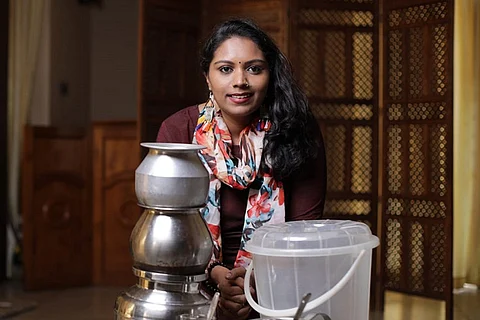

For Soumya Sanathanan, music is not a mundane job. It is a space where she explores her creative side. As a musician, she is very particular about keeping a unique approach to her work and has secured many feathers on her cap in a short span.
She was the first to come up with an acapella cover in Malayalam. Last Christmas, she composed ‘Jingle Bells’ using 25 instruments such as wave shaker, egg shaker, kazoo, cowbell, high hats and the chenda. She played the instrument HAPI drum, a steel tongue drum that produces musical notes when struck with a mallet or hands, in the music video Hapi met a Flute. The list goes on.
Now, she is back in the limelight for composing the song ‘Kalakkatha: Dedication to Womanhood’ using sounds of household activities and kitchen utensils. The project, inspired by the popular ‘Kalakkatha’ song from the movie Ayyappanum Koshiyum was released on the Women’s Day and has garnered more than 95k views on YouTube.
The song begins with the sounds and visual of a woman sweeping with the broom. It is followed by sounds of rice winnowing, tapping of a spoon on glass, drumming on a bucket, handwashing of clothes, pressure cooker, coconut scraping, frying fish and so on, as images of women doing various activities come and go.
Soumya has arranged and sung the song penned in Malayalam by NV Ajith. “He also did the visualisation,” says the composer who was struck by the folk song in Ayyappanum Koshiyum.
“A musical using kitchen utensils has been on my mind for some time. When I heard this song, I found its folk style suitable for that. The original song is written in the folk language. Ajith wrote the lyrics in tune with the theme of women’s empowerment,” explains Soumya. Arun Devv has done the cinematography.
Everything, from recording the sounds and arranging them, was done in a few days. Soumya used the zoom recorder to capture sounds live. “Everything except a few additional percussions like drumming on the bucket and tapping spoon on glass was recorded live. Usually, women talk a lot while doing household chores. So, recording those sounds without noise was a task,” she says with a smile.
Additional percussions and a humming track by Soumya were recorded in the studio. “The vocal part has been added to bring a melodic touch in the composition. Except that, only sounds of kitchen utensils and household chores are used in this piece of work. The bucket and broom sounds are mainly used to form the bass,” she says. “The sound varies at each level. For instance, the pitch of washing sound varies as per the force we apply. Different spoons create different sounds.”
Watch:
Soumya has recorded numerous sounds like even the opening and closing of a microwave oven, but has not used all of these.
“I have arranged sounds in a way that the listener could differentiate them,” says Soumya, a percussion lover. Her fondness for percussion began at a very young age.
“My love for percussion started when I was in Class VI. I was inspired by the way one of my peers drummed on a bench in the class. Close to my home was a tabla class which I joined,” says Soumya, who began her career as a playback singer.
Her passion for the tabla increased when she returned to her career after a brief sabbatical.
“I felt I had to learn to play the tabla more and restarted lessons. Gradually, I got familiar with new instruments,” she adds.
She has a collection of percussions that contains around 40 instruments. Of them, she can play 30 instruments well. Many of those percussions have found a place in her creations.
A post-graduate in Music and Psychology, Soumya is currently pursuing her PhD in Music. Her research is on the possibilities of using Western techniques in Carnatic music. She also teaches the tabla to students with autism. As her journey goes on, she hopes to create more such interesting musicals in the future.